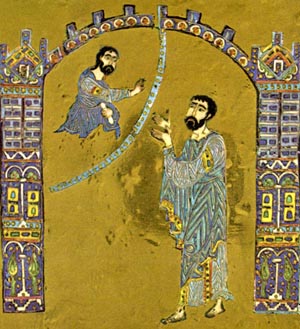 |
The Saint of the Day
St. Saturninus, November 29
Prof. Plinio Corrêa de Oliveira
Biographical selection:
St. Saturninus was a disciple of St. John the Baptist and became a follower of Our Lord. Later he was consecrated Bishop by St. Peter and was sent as a missionary from Rome to the Pyrenees Mountain area. He became the first Bishop and Apostle of Toulouse, France.

St. Peter sent out apostles to spread the Word of Christ. St. Saturninus became the first Bishop of Toulouse |
In Toulouse there was a temple dedicated to the pagan gods. Everyday St. Saturninus used to have to pass in front of it to go to the church where the Christians would gather. The devils, unable to bear the presence of the man of God, abandoned the idols, which stopped giving the counsels and prophecies they used to speak. The pagan priests offered all kinds of sacrifices, but the idols remained mute.
An enemy of the Christians discovered the cause of the silence of the idols. One day, as St. Saturninus was passing and the pagan priests were preparing to offer the sacrifice of a bull in honor of Jupiter, the man shouted: “This man is the enemy of our gods, the one who prevents them from making oracles. But now the gods have delivered him into our hands so that we might avenge the grievances made against them.”
The crowds seized the Bishop and dragged him before the pagan altar to oblige him to sacrifice to the false gods. But St. Saturninus addressed the people and said: “I adore the one true God, and only to Him do I offer my homage and sacrifices. In face of this, your idols have become silent. Your gods are devils who fear the true God and are more delighted with deceiving your souls than receiving the sacrifices of your bulls. They tremble before me because I represent the true God.”
Furious over his answer, the pagan priests tied St. Saturninus to the feet of a wild bull, which dashed through the city and killed him, tearing him to pieces. His remains were collected by two young women who did not fear facing the furor of the people.
Comments of Prof. Plinio:
In this text one has a magnificent picture of the fight of good against evil. St. Saturninus was a saint whose virtue and presence in Toulouse caused the demons who inhabitated the idols to become mute. For before a man of God, the devil is a coward who flees. Therefore, the idols could not say anything to their followers. From this situation came the martyrdom of St. Saturninus.
We could ask:
• Why don’t the devils become mute today in the presence of good persons?
• Why do things like this no longer happen?
I will try to give answers to these questions.

The pilgrim statue of Our Lady of Fatima
wept in New Orleans in 1972.
Below, a close-up of a tear
 |
First, even if we are not saints, sometimes when we write something in defense of the Catholic Church or Christian Civilization, the enemies become mute, unable to make a response. This is a fact that presents itself as merely natural, and not supernatural or preternatural. But according to a sound Catholic principle, in every natural action there is always an Angel and a devil that follow it and encourage man either to good or evil. When we make a good defense of the Catholic cause, certainly there are devils who become mute and can no longer help the enemies. In a certain way, therefore, something similar to what happened to the demons in the presence of St. Saturninus also takes place in our fight.
Second, obvious supernatural facts like what happened with St. Saturninus do not take place today because, on one hand, God has distanced Himself from this earth. He does not give such miracles to this revolutionary world, because it is not worthy of such things.
Someone could object: But if He would work miracles like that, then the world would change.
I don’t think so. You can observe the statues of Our Lady that have wept in various places. Notwithstanding, nothing changed. People ordered chemical examinations of her tears. The lab results concluded that the tears were actually human tears – that is to say, a manifest miracle. Still, practically no one changes his life. People have reached a degree of insensibility to the supernatural that almost nothing can change them.
You can note the silence that has fallen over Lourdes. We could almost say that Lourdes hardly exists anymore. Why? Because people today scorn miracles and thus are no longer worthy of them.
This is the reason why for some time Our Lady has wept. Doing this, she nourishes the piety of the good Catholics. She also leaves evidence that she forewarned mankind of the catastrophe that is near.
On the other hand, the devils have today a dominion over the world that they did not have at the time of St. Saturninus. In our days we are facing not only the devils of the air, but also and principally the devils of Hell. Perhaps you remember that Pope Leo XIII had a vision warning him that the devils of Hell would shortly be released on earth. Well, I think that they were set at large and are present everywhere intensifying the action of the devils of the air and making men much worse. This is another reason why the magnificent facts of the life of St. Saturninus are not repeated today.
We should ask Our Lady through the intercession of St. Saturninus to shorten these sad and terrible times and permit the good to once again be visibly triumphant over the devils for the greater glory of God.


  | | Prof. Plinio Corrêa de Oliveira | |
The Saint of the Day features highlights from the lives of saints based on comments made by the late Prof. Plinio Corrêa de Oliveira. Following the example of St. John Bosco who used to make similar talks for the boys of his College, each evening it was Prof. Plinio’s custom to make a short commentary on the lives of the next day’s saint in a meeting for youth in order to encourage them in the practice of virtue and love for the Catholic Church. TIA thought that its readers could profit from these valuable commentaries.
The texts of both the biographical data and the comments come from personal notes taken by Atila S. Guimarães from 1964 to 1995. Given the fact that the source is a personal notebook, it is possible that at times the biographic notes transcribed here will not rigorously follow the original text read by Prof. Plinio. The commentaries have also been adapted and translated for TIA’s site.
|
Saint of the
Day | Home | Books
| CDs | Search
| Contact Us | Donate

© 2002- Tradition in Action, Inc. All Rights Reserved
|
 |

|